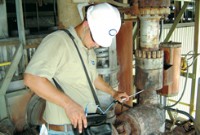Total Valve Management Program
Cycle isolation eliminates energy losses attributable to poorly performing or leaking steam, water cycle isolation valves.


Engineered performance solution
TVM™ next-generation thermal and acoustic valve monitoring program covers all types of valves and provides a key solution in helping customers monitor valve performance and determine steam leakage, whilst reducing CO2 emissions.
Calculation of related heat loss is accomplished using in-house computer models developed for each typical power plant valve application, along with the process temperature and pressure data. The heat loss calculations are accurate within a 3% margin of error.
The steps you need to take to generate a TVM report are:
1. MCE receives instruction to proceed.
2. All valves to be included in survey are defined.
3. MCE technician attends site and conducts survey.
4. Process data is collected; heat & acoustic
readings taken.
5. Customised computer model provides results of survey.
6. Turnaround 2 weeks
Subsequently, a detailed survey is produced to determine valve leakage providing quantitative results (leakage is shown in lbs/hr. and MMBtu), not qualitative estimates. The results determine the cost of lost steam and provide return on investment calculations furthermore; they are the building blocks of an in-depth historical database for predictive replacement analysis. The survey will also compile a repair/replacement list based on safety, economics and reliability, regardless of valve type or manufacturer. It will also identify those valves in the survey which do not require attention/replacement.
The TVM report shall provide objective data deemed necessary to allow the maintenance team to plan outages efficiently. The key benefits of the program include operational cost assessments, useful for prioritizing valve repair and/or replacement undertakings during pre-outage and determining the success of the repair or replacement during post–outage. Not only are energy costs reduced, but maintenance cost reductions can also be realized and shut-downs simplified.
Valve leakage increases over time, particularly in high energy systems. It is highly recommended that regular cycle isolation testing is employed to maintain plant efficiency and mitigate environmental impact. Other benefits are:
1) Cost avoidance of unnecessary repairs by identifying tight valves.
2) Reductions in cycle make up requirements
3) Protection of other plant equipment from unnecessary heat loads or water induction problems
4) Confirmation that plant equipment can be isolated for repairs
5) A program approach to cycle isolation will not only help maintain peak efficiency but will decrease overall valve operations and maintenance costs.
6) Remember! From April 2010 you may be paying for your carbon emissions. Why not act now and create major cost savings by implementing a TVM scheme?
MCE Group
Tel: 01642 882211
Website: http://www.mceplc.com

| Telephone: | 01642 882211 |
| Email: | enquiry@mce-group.com |
| Website: | www.mce-group.com |
| More information on the MCE Group Ltd BVAA Member Directory Page |
Search related valve / actuator articles: MCE Group LtdIssue 12Valve Repair and Service







-web.jpg)





